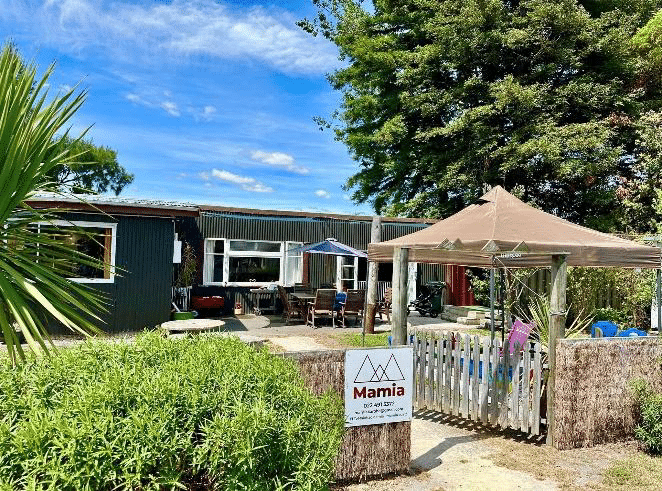Dr Aria Graham – mum, nurse, PhD, and passionate advocate for new mothers and tamariki – describes her not-for-profit in Waipatu as “a magic garden”.
“There’s always a pot on the stove, and every kind of stew or curry or soup being made. Someone’s baking focaccia. There are māmā lying on their Swiss balls doing yoga, or learning te reo Māori and tikanga. There’s a hīkoi to Aunty’s Garden next door to fill our kitchen with fresh kai. That’s the kaupapa we’ve created and we see the magic daily when people are smiling, babies are cuddled, and connections are made.”
Mamia is a kaupapa Māori, holistic, wraparound service and a place for māmā-to-be, new māmā and their pēpi to come. And it’s for everyone. “We have a diverse range of mums arrive here, who might be resourced and have their own cars, who might be lonely, worried and needing time out – and equally we have mothers coming from difficult and challenging family, financial and housing situations, where access to [culturally] appropriate services is lacking, but who need support,” says co-founder Dr James Graham, Aria’s husband.
On any given day, Mamia’s team of paid staff, alongside a squad of dedicated volunteers, prepare and share kai, nourish, nurture and awhi any mum who needs it, all from within their small network of upcycled sheds and containers on Waipatu Marae. Here, māmā attend appointments, courses, can have a shower or take a nap while baby is cared for by a trusted ‘aunty’.
And the kaupapa has expanded through to toddlers and pre-schoolers. With partial funding from Hawke’s Bay Foundation, Mamia now offers a new service that’s moving the dial when it comes to cognitive, developmental and behavioural support for under-5s.
Aria (Ngāti Kahungungu, Ngāti Porou, Samoan), who holds a PhD in maternal wellbeing using kaupapa Māori methodology, says for many whānau, traditional paediatric services are out of reach, wait lists too long, or tamariki are considered too young to be treated.
She innovated Tākuta Tamaiti, a child development initiative within the Mamia kaupapa, for whānau of tamariki, who are struggling with neuro-divergencies or behavioural matters. With James (Ngāti Kahungunu, Ngai Te Whatuiāpiti) – a Māori educational specialist – they applied to organisations for funding and support to get the initiative over the line.
Hawke’s Bay Foundation’s grant has helped progress the initiative, which launched in 2024, by covering the development of material resources and funding managerial and administrative functions. Now, Aria and James employ two part time staff – a paediatrician and a cultural therapist – who work hand-in-hand with whānau to improve understanding and outcomes for their more challenged children.
“Having financial support from Hawke’s Bay Foundation allows us to utilise the frameworks we’ve developed in a new way,” says Aria. “It means whānau can come to us for a kōrero with our specialist team and we have the ability and the freedom to support them. We have been able to adapt and be responsive to this need.”
Aria, who is also the chair of the marae, says the ability to “pivot and respond” is what makes Mamia such a special place to be. She hopes there will be more opportunities to create magic in the garden, because the need, she says, is great. “Mamia is not just about the now, but about the generations to come. If we do good work with parents, we listen to their needs, and we pull together a kaupapa which we develop with them, we’re able to make a bigger impact – and not just with them, but with and for their mokopuna. We’re planting seeds in the magic garden that they will keep cultivating themselves.”

